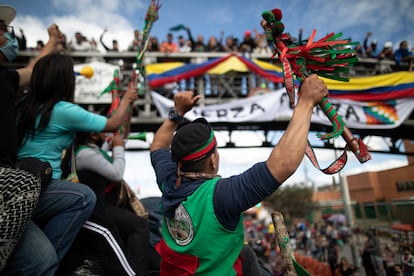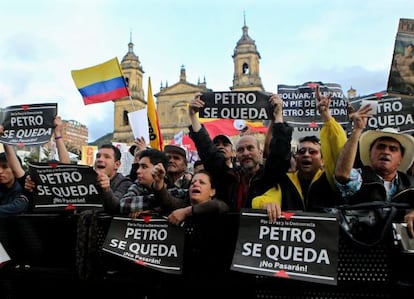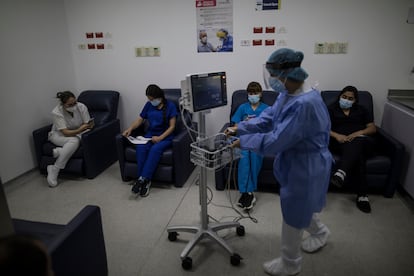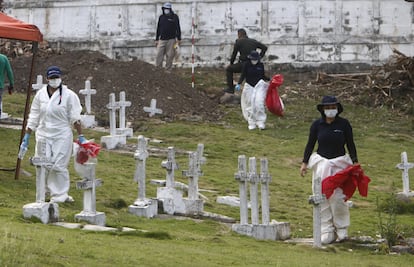Politics, peace and poverty: a powder keg called Colombia
High violence rates, the struggle for judicial independence and a lack of progress with the Havana peace accords collide with a presidential election campaign in 2022

To say that over the past few years something approaching dead calm has descended on Colombia could be considered erroneous. High rates of violence, the clash over judicial independence and a lack of progress in the implementation of the peace process have cast any hypothetical plain sailing into the wind. The problem is that today, even more uncertainty has been added to Colombia’s problems: public healthcare of course, as a result of the coronavirus pandemic, but also economic concerns, with an alarming increase in poverty and a serious lack of institutional cash flow.
All of this, amplified by the upcoming presidential elections in 2022, has served to place Colombia in a situation that has a recurring resonance in the country’s history: just when it appears everything is about to go up in smoke, it is smoothed over instead. There is a palpable tension in the air and in speeches, such as those held recently by a procession of senior politicians and analysts that have given rise to a number of key points offering a sneak preview into what promises to be an uncertain year ahead.
(Almost) everyone against Petro. Next year’s elections already permeate every aspect of Colombia’s daily life. If in any other part of the world it could be reasonably expected that the potential candidates would be defined at this stage, but drawing up a diagram in Colombia is practically impossible due to a convoluted consultation process among political parties that can result in anything up to 20 contenders. These will eventually be whittled down to no more than a selection of five: those who have the best chances in the first round of voting scheduled for May 2022, two months after the Congressional elections have been held. The only certainty, whether we are on the left or the right, is that Gustavo Petro is the man to beat. The former mayor of Bogotá and an ex-M19 guerrilla, Petro has embraced a change of tack toward pragmatism similar to that which swept Andrés Manuel López Obrador to power in Mexico in 2018. This shift has attracted politicians of all persuasions and, more importantly, powerful networks of patrons while attempting to assuage the fears that many sectors, principally those of an economic nature, hold over the prospect of electing a first leftist president in Colombia’s history.

In the progressive center, the latest attempt to ascend to the presidency by former Medellín Mayor Sergio Fajardo is as certain as the number of “buts” that accompany every mention of his name. Meanwhile, the expectations generated by former Health Minister Alejandro Gaviria throwing his hat into the ring are as dizzying as the challenges that lie ahead of him: firstly, to convince himself of his own decision, and secondly to align himself with the structure of parties such as the Liberals and the Greens, which will come at a high cost to his campaign. On the conservative side there is fervor for a grand alliance, but it remains unclear what sort of weight will be provided by the candidate put forward by the Democratic Center, the ruling party founded by Álvaro Uribe and run under the iron fist of the former president.
COVID-19 vaccination delays. As is the case in most Latin American countries, with the exception of Chile, Colombia is lagging behind both in procurement and distribution of COVID-19 vaccines. Far from railing against the most developed nations or the pharmaceutical industry, President Iván Duque has been transmitting a message of optimism that flies in the face of hard data. Colombia passed the symbolic barrier of one million vaccinations in the third week of March, representing two doses per 100 inhabitants, roughly half of what Mexico has managed in total but at a faster rate, as Colombia’s rollout began later. In order to vaccinate 70% of the population before the end of the year, the target the authorities have set themselves, 200,000 doses will need to be administered daily. Up to now, the single-day record stands at 109,000 and the average number of vaccinations per day has been approximately 50,000.
A “social” tax reform. Colombia is set to become the first country in the region – although more will certainly follow suit – to implement tax reform, seen by many as necessary and overdue in equal measure: a bone of contention with the markets in view of sustaining current investment levels and another primer for a weary population. Cognizant of this, the government has gone to great lengths to sell it as a “social” initiative. What is undeniable is that for the government to provide the benefits it has promised the citizenry, it needs money and some 40% of products in Colombia are VAT-exempt. Duque insists there will be no tax on everyday foodstuffs but he has also failed to give a credible answer to the doubts generated by a reform that is also likely to meet with little enthusiasm in a Congress consumed by electoral matters.

Tension in the streets. The pandemic has condemned three million people back into poverty. The fuse that was lit at the end of 2019 has not been extinguished – it was reignited amid displays of police brutality last September – and growing xenophobia toward hundreds of thousands of Venezuelan migrants is flammable material in an electoral context. In the political sphere there are plenty of voices, within the governing party and in opposition, warning that social and economic setbacks combined with a vaccination program that has yet to fully take off could result in a backlash against the Democratic Center and torpedo their ambitions in the presidential elections.
Chronic insecurity. Drug trafficking remains one of the biggest problems that Colombia faces. Battles between FARC and ELN dissidents and other criminal gangs, or the free-for-alls being staged in some areas, are serving to perpetuate a chronic issue. Massacres of dozens of people are no longer the norm in Colombia, but shootings remain constant. Up to mid-March there had been 17 reported, with 65 victims, the majority of them social leaders. More environmentalists are killed in Colombia than anywhere else in the world, a bloodletting that the government is incapable of putting a stop to. A sense of insecurity has skyrocketed in the big cities. A recent survey found that 76% of people in Bogotá do not feel safe – largely due to an increase in robberies – a rise of 16 percentage points over the same poll in 2019.

A report to reconcile a country. Colombia has been waiting three years for the Truth and Reconciliation Commission resulting from the Havana peace agreement between the government and FARC rebels to deliver its report. What was seen as a parting of the waters toward reconciliation in Colombia could yet serve to exacerbate growing polarization, not least among the government, the ruling party and those critics of the pact who have not conceded a millimeter of peace during this time. Meanwhile, former rank-and-file combatants are urging the implementation of the agreement to bring an end to the hunting down of their leaders and to facilitate a return to normal life in rural areas, which were the hardest hit during decades of violence. A devastating report by the Special Jurisdiction for Peace, which states there were 6,400 extrajudicial killings of supposed FARC combatants by the military between 2002 and 2008 – the so-called “false positives” – has placed the Havana agreement’s principal detractor, former president Álvaro Uribe, back under the spotlight.
Uribe and justice. There is no figure in the political history of Colombia who attracts as much attention as Álvaro Uribe. Twenty years after his ascent to power, the country has had a glimpse of a post-Uribe political landscape but has yet to fully feel it. The attrition is such that the former president’s legacy now faces the paradox that after eight years in power and having hand-picked his two successors – Juan Manuel Santos broke his ties with Uribe when he won the presidency, something that has been neither forgiven nor forgotten by his former mentor – it paved the way for a leftist president to possibly assume the reins. In the meantime, the next year will be marked by the judicial process against him, one that has set the Supreme Court of Justice, one of the institutions the state is built upon, and the Public Prosecutor’s Office, which is inclined to acquit Uribe of charges of alleged bribery, witness tampering and crimes against humanity, on a collision course. Among Uribe’s closest advisors there is a feeling that a trial is inevitable, one that will be staged in the middle of an electoral campaign. More flammable material for Colombia’s powder keg.
English version by Rob Train.
Tu suscripción se está usando en otro dispositivo
¿Quieres añadir otro usuario a tu suscripción?
Si continúas leyendo en este dispositivo, no se podrá leer en el otro.
FlechaTu suscripción se está usando en otro dispositivo y solo puedes acceder a EL PAÍS desde un dispositivo a la vez.
Si quieres compartir tu cuenta, cambia tu suscripción a la modalidad Premium, así podrás añadir otro usuario. Cada uno accederá con su propia cuenta de email, lo que os permitirá personalizar vuestra experiencia en EL PAÍS.
¿Tienes una suscripción de empresa? Accede aquí para contratar más cuentas.
En el caso de no saber quién está usando tu cuenta, te recomendamos cambiar tu contraseña aquí.
Si decides continuar compartiendo tu cuenta, este mensaje se mostrará en tu dispositivo y en el de la otra persona que está usando tu cuenta de forma indefinida, afectando a tu experiencia de lectura. Puedes consultar aquí los términos y condiciones de la suscripción digital.









































